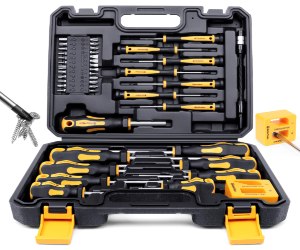 Selecting the appropriate screwdriver might seem simple to you, but it might be more difficult than it seems due to the range of screw types, materials, and project requirements. The right screwdriver ensures effective and safe task completion whether you’re working on electronics or taking on a do-it-yourself home improvement project. This thorough information will assist you in making a good choice.
Selecting the appropriate screwdriver might seem simple to you, but it might be more difficult than it seems due to the range of screw types, materials, and project requirements. The right screwdriver ensures effective and safe task completion whether you’re working on electronics or taking on a do-it-yourself home improvement project. This thorough information will assist you in making a good choice.
1. Be Familiar With Screw Heads and Types
There are many different kinds of screws, and for every type, there is a corresponding screwdriver that is needed. Typical screwheads consist of the following.
- Flathead (slotted)
A flathead screwdriver is needed to create a single slot across the head.
- Phillips
The cross-shaped head is meant to keep the tool from slipping while in use.
- Torx (star)
A head fashioned like a star that improves torque transmission and grip.
- Hex (allen)
An internal six-sided hexagonal drive appropriate for situations requiring high torque.
- Pozidriv
This product is comparable to Phillips but has extra features to lessen cam-out.
It’s important to know what kind of screwdriver to use because using the incorrect one can damage the screw head and make it impossible to remove or reuse.
2. Examine the Screw’s Material
A variety of materials, including brass, zinc-plated steel, stainless steel, and more, can be used to make screws. The strength, resistance to corrosion, and environmental compatibility of the screw are all influenced by the material.
- Stainless Steel
Because it resists corrosion, this material is perfect for use in damp or outdoor settings.
- Brass
Because of its look and non-magnetic qualities, brass is frequently utilized in electronics and decorative applications.
- Zinc-Plated Steel
Offers good resistance to corrosion and is reasonably priced for indoor use in general.
3. Assess Your Project’s Needs
To decide which screwdriver characteristics you’ll need, take into account the size and type of your project.
- Length and Size
Verify that the screwdriver is the right size for your hand and that it can, if needed, reach into small areas.
- Handle Grip
During extended use, ergonomic handles lessen strain and fatigue.
- Magnetic Tip
Screws are held firmly in place by a magnetic tip, which keeps them from falling or losing their position.
- Revolving Cap
Exact control and effective turning are made possible by the revolving cap at the handle’s end.
Use screwdrivers with finer tips and stable, controllable handles for precision work on electronics and delicated assemblies.
4. Determine the Needs for Power and Speed (Electric Screwdrivers)
For repetitive work, electric screwdrivers are efficient and convenient. Take into account the following aspects while selecting an electric screwdriver.
- Power Source
While corded screwdrivers require no battery changes, cordless screwdrivers are more portable.
- Speed Settings
Depending on the needs of the project, variable speed settings enable fine control.
- Torque Control
Variable torque settings guard against material and screw damage from over-tightening.
For larger projects or jobs that need a lot of screwing and unscrewing, such assembling or building furniture, electric screwdrivers are appropriate.
5. Sturdiness and Quality
Purchasing high-quality screwdrivers guarantees their dependability and lifespan.
- Reputation of the Brand
Reputable brands frequently provide higher-quality components and craftsmanship.
- Warranty
A strong warranty demonstrates confidence in the robustness and functionality of the product.
- Evaluations and Suggestions
To evaluate the screwdriver’s longevity and performance in practical uses, see user evaluations.
6. Custom Screwdrivers for Unique Projects
Specialized screwdrivers might be needed for the following given projects.
- Precision Screwdrivers
These small, accurate tools are ideal for fine jobs like repairing electronics. Impact drivers are made for heavy-duty tasks requiring a lot of speed and torque.
- Precision Screwdrivers
These small, accurate tools are ideal for fine jobs like repairing electronics. Impact drivers are made for heavy-duty tasks requiring a lot of speed and torque.
- Ratcheting Screwdrivers
These tools have a ratchet mechanism that enables smooth, rapid turning in confined areas.
To find out if a specialist screwdriver is required for your job, identify any unusual requirements.
7. Care and Handling
Careful upkeep increases the screwdrivers’ lifespan. For example,
- Cleaning
To avoid accumulation and guarantee a tight fit in screw heads, clean screwdriver tips on a regular basis.
- Storage
To avoid rust and handle damage, keep screwdrivers in a dry location.
- Sharpening and Repleasing
Renew screwdrivers that have reached the end of their useful life or sharpen worn-out or damaged points.
You can choose the ideal screwdriver for your task and ensure effectiveness, safety, and top-notch outcomes by adhering to these recommendations. Keep in mind that the appropriate instrument improves your overall experience and happiness with the project’s outcome in addition to making the task at hand simpler.
Leave a Reply